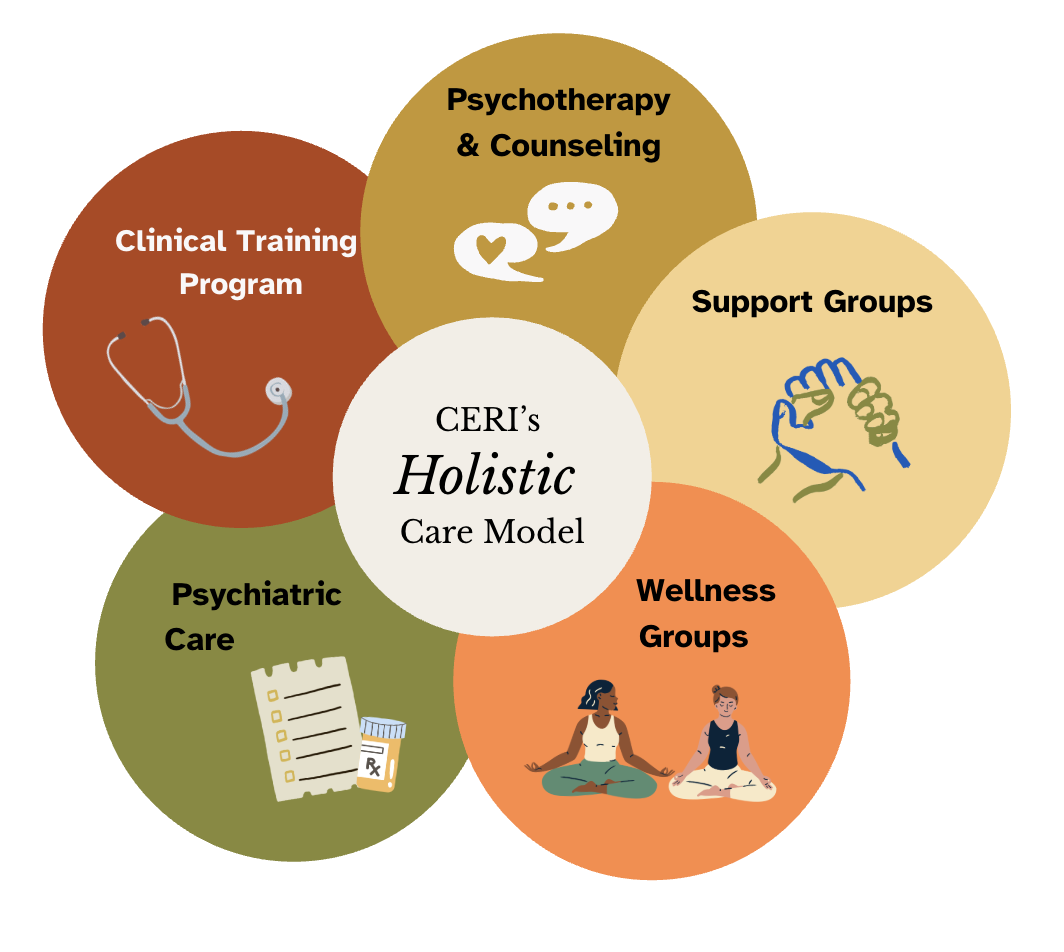Mental Health Services
CERI’s clinical framework is rooted in the belief that healing happens in relationships, and we strive to create healing spaces that support both individual and collective well-being through a commitment to social justice.
We provide trauma-informed, culturally responsive care that acknowledges the inherent dignity of each individual and the full context of their experiences. Our approach is guided by feminist and humanistic principles, integrating somatic practices, such as mindfulness and body awareness, to support emotional regulation and foster a sense of safety.
Our programs
Psychotherapy and Counseling
We provide psychotherapy and counseling to individuals, couples, and families using a range of therapeutic modalities—including Internal Family Systems (IFS), Eye Movement Desensitization and Reprocessing (EMDR), Narrative Therapy, and Expressive Arts. We have seen that these modalities resonate with immigrant and refugee communities because they are non-pathologizing, emphasizing a collective approach (an “internal family”) and honoring the wisdom of the body.
Wellness Groups
Through ongoing and short term wellness groups, we promote a holistic view of mental health services, uplift culture, and nurture the body, mind, and spirit through movement and art. Examples of recent wellness groups include elder self defense, yoga, zumba, and creative workshops, such as mandala making.
Psychiatric Clinic
Each month, we host a clinic in which psychiatrists work with CERI therapists to coordinate care, evaluations, and medication management for clients.
Support Groups
In support groups, initially developed with Cambodian genocide survivors, participants share about their lives and are held in caring, empathetic group space. Today, alongside our elder survivors groups, we also have groups for youth, women, and the 1.5 generation - refugees and immigrants who arrived as young children or adolescents. Support groups provide care to systems impacted individuals and families along with people who have received dual diagnoses. Currently, we facilitate nine weekly or biweekly support groups, and continue to grow to meet community needs.
Clinical Training Program
In CERI’s graduate level mental health internship program for social work and counseling students, interns from refugee and immigrant backgrounds receive clinical training and supervision as they gain hands-on experience providing trauma-informed care. Over 30 graduate students have completed our program.
Our program (version 2)
Psychotherapy and Counseling
We provide a range of therapeutic modalities—including Internal Family Systems (IFS), Eye Movement Desensitization and Reprocessing (EMDR), Narrative Therapy, and Expressive Arts. We have seen that these modalities resonate with immigrant and refugee communities because they are non-pathologizing, emphasizing a collective approach (an “internal family”) and honoring the wisdom of the body.
Wellness Groups
Through ongoing and short term wellness groups, we promote a holistic view of mental health services, uplift culture, and nurture the body, mind, and spirit through movement and art. Examples of recent wellness groups include elder self defense, yoga, zumba, and creative workshops, such as mandala making.
Psychiatric Clinic
Each month, we host a clinic in which psychiatrists work with CERI therapists to coordinate care, evaluations, and medication management for clients.
Support Groups
In support groups, initially developed with Cambodian genocide survivors, participants share about their lives and are held in caring, empathetic group space. Today, we also have groups for youth, women, and the 1.5 generation. Support groups provide care to systems impacted individuals and families along with people who have received dual diagnoses. Currently, we facilitate 9 weekly or biweekly support groups, and continue to grow to meet community needs.
Clinical Training Program
In CERI’s graduate level mental health internship program for social work and counseling students, interns from refugee and immigrant backgrounds receive clinical training and supervision as they gain hands-on experience providing trauma-informed care. Over 30 graduate students have completed our program.


